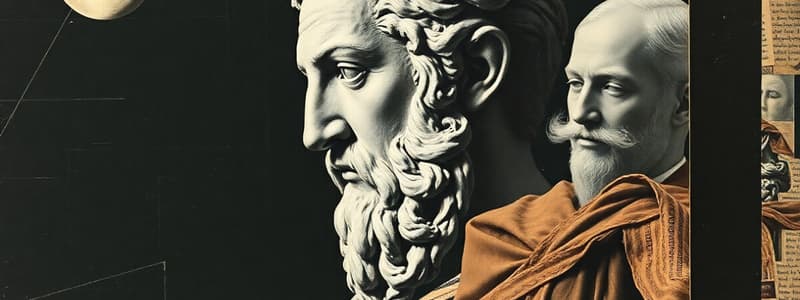Podcast
Questions and Answers
What did Plato establish in Athens that lasted for nearly a millennium?
What did Plato establish in Athens that lasted for nearly a millennium?
- The Academy (correct)
- The Stoa
- The Agora
- The Lyceum
In the Theory of Forms, what are considered to be the true objects of knowledge?
In the Theory of Forms, what are considered to be the true objects of knowledge?
- Physical objects
- Mathematical concepts
- Human experiences
- Eternal Forms (correct)
Which allegorical scenario demonstrates Plato's idea of the ascent from ignorance to enlightenment?
Which allegorical scenario demonstrates Plato's idea of the ascent from ignorance to enlightenment?
- The City-State
- The Allegory of the Cave (correct)
- The Myth of Er
- The Divided Line
What concept argues that philosophers should rule due to their wisdom and understanding?
What concept argues that philosophers should rule due to their wisdom and understanding?
Which work focuses on the immortality of the soul?
Which work focuses on the immortality of the soul?
What is the primary theme explored in Plato's dialogue 'Republic'?
What is the primary theme explored in Plato's dialogue 'Republic'?
Which of the following philosophers challenged aspects of Plato's ideas?
Which of the following philosophers challenged aspects of Plato's ideas?
What is one of the levels of reality illustrated by Plato's Divided Line?
What is one of the levels of reality illustrated by Plato's Divided Line?
Flashcards
Plato
Plato
A Greek philosopher born around 428/427 BCE in Athens, influenced by Socrates and known for his works in Western philosophy.
Theory of Forms
Theory of Forms
Plato's concept that non-material abstract Forms represent the most accurate reality, unlike physical objects which are imperfect.
The Divided Line
The Divided Line
A metaphor used by Plato to illustrate levels of reality and knowledge, from shadows to true knowledge of the Forms.
Allegory of the Cave
Allegory of the Cave
Signup and view all the flashcards
Justice (in Plato's philosophy)
Justice (in Plato's philosophy)
Signup and view all the flashcards
Philosopher-King
Philosopher-King
Signup and view all the flashcards
Republic
Republic
Signup and view all the flashcards
Aristotle
Aristotle
Signup and view all the flashcards
Study Notes
Life and Influences
- Born around 428/427 BCE in Athens, Greece, to an aristocratic family.
- Studied under Socrates, a pivotal influence shaping his philosophical views.
- Established the Academy in Athens, a philosophical school that lasted for nearly a millennium.
- Wrote dialogues, a literary form crucial to transmitting his ideas.
- Influenced by Presocratic philosophers, like Heraclitus and Parmenides, concerning truth and reality's nature.
- His views differed from contemporary Sophists, who focused on rhetoric and practical skills. He emphasized reason and philosophical inquiry.
- Experienced Athenian political life, which may have contributed to his critical examination of society in his works.
- His work had a significant impact on Western philosophy and continues to be studied and debated today
Philosophical Core Concepts
- Theory of Forms: Postulated the existence of eternal, perfect, and unchanging Forms (or Ideas) that transcend the physical world. These Forms are the true objects of knowledge.
- The Divided Line: A metaphor illustrating the varying levels of reality and knowledge, ranging from shadowy appearances to the Forms themselves.
- Shadowy appearances
- Belief, dealing with physical objects
- Mathematical reasoning dealing with idealized objects
- Knowledge, concerned with the Forms themselves.
- Allegory of the Cave: Illustrates the ascent from ignorance to enlightenment, and the difficulty of convincing others to embrace truth.
- Justice: A central concept in Plato's ethical thought, often explored in his dialogues. He aimed to explain the elements of a just individual and a just state.
- Philosopher-King: Argued that philosophers, possessing wisdom and reason, are the best rulers. The philosopher's understanding of the Forms would guide them to create a just and virtuous society.
Key Works
- Republic: Explores justice and the ideal state. Features the Theory of Forms, the Allegory of the Cave, and the concept of the Philosopher-King.
- Phaedo: Examines the immortality of the soul, using arguments to support the idea that the soul can exist independently of the body.
- Symposium: Explores the nature of love and beauty.
- Meno: Discusses knowledge and recollection.
- Phaedrus: Explores the nature of the soul and rhetoric.
Influence
- Aristotle: His most famous student, who later developed his own system of philosophy and challenged certain aspects of Plato's ideas.
- Western thought: Plato's work influenced numerous later philosophers, theologians, and thinkers, shaping philosophical discourse across centuries.
- Political philosophy: His theory of the ideal state and the Philosopher-King influenced political thought and ideal forms of governance.
- Educational thought: Emphasis on reason and philosophical inquiry continues to inspire approaches to education.
Studying That Suits You
Use AI to generate personalized quizzes and flashcards to suit your learning preferences.




